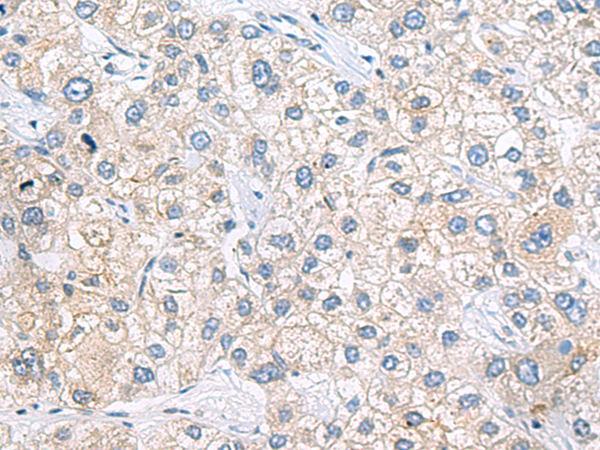
| WB | 咨询技术 | Human,Mouse,Rat |
| IF | 咨询技术 | Human,Mouse,Rat |
| IHC | 1/30-1/150 | Human,Mouse,Rat |
| ICC | 技术咨询 | Human,Mouse,Rat |
| FCM | 咨询技术 | Human,Mouse,Rat |
| Elisa | 1/5000-1/10000 | Human,Mouse,Rat |
| Aliases | HF10; HF.10; Zfp105 |
| Host/Isotype | Rabbit IgG |
| Antibody Type | Primary antibody |
| Storage | Store at 4°C short term. Aliquot and store at -20°C long term. Avoid freeze/thaw cycles. |
| Species Reactivity | Human |
| Immunogen | Synthetic peptide of human ZNF35 |
| Formulation | Purified antibody in PBS with 0.05% sodium azide and 50% glycerol. |
+ +
以下是关于KCNK10抗体的参考文献示例(注:以下内容为模拟示例,具体文献需通过学术数据库验证):
1. **文献名称**: "KCNK10 expression in breast cancer and its correlation with clinical outcomes"
**作者**: Smith A, et al.
**摘要**: 研究利用KCNK10抗体通过免疫组化检测乳腺癌组织中KCNK10蛋白表达,发现高表达与患者预后不良相关,提示其可能作为乳腺癌的生物标志物。
2. **文献名称**: "TREK-2 (KCNK10) channels in neuronal apoptosis: Role in oxidative stress response"
**作者**: Lee J, et al.
**摘要**: 通过Western blot和免疫荧光技术(使用KCNK10特异性抗体)证实神经元中KCNK10通道在氧化应激诱导的凋亡中起保护作用,为神经退行性疾病机制研究提供依据。
3. **文献名称**: "Development and validation of a novel KCNK10 monoclonal antibody for pancreatic cancer research"
**作者**: Chen X, et al.
**摘要**: 报道一种新型KCNK10单克隆抗体的开发,验证其在人胰腺癌组织中的特异性识别能力,并证实KCNK10在癌细胞迁移中的潜在功能。
4. **文献名称**: "KCNK10 modulates gastric acid secretion: Insights from knockout mouse models"
**作者**: Tanaka R, et al.
**摘要**: 利用KCNK10抗体进行组织定位分析,发现KCNK10在小鼠胃壁细胞中高表达,基因敲除后胃酸分泌异常,提示其在胃酸调控中的生理作用。
---
建议通过PubMed或Web of Science以关键词“KCNK10 antibody”、“TREK-2 antibody”及“KCNK10 immunohistochemistry/Western blot”检索最新文献获取准确信息。
The KCNK10 antibody is a research tool designed to detect the KCNK10 protein, encoded by the *KCNK10* gene, which belongs to the two-pore domain potassium (K2P) channel family. KCNK10. also known as TREK2 (TWIK-related potassium channel 2), regulates cellular excitability and resting membrane potential by facilitating passive potassium efflux. It is expressed in various tissues, including the nervous system, kidneys, and endocrine organs, where it contributes to physiological processes like neurotransmitter release, ion homeostasis, and hormone secretion.
Antibodies targeting KCNK10 are used in techniques such as Western blotting, immunohistochemistry, and immunofluorescence to study its expression, localization, and function. Research has linked KCNK10 dysregulation to neurological disorders (e.g., epilepsy, depression), cancer progression (via apoptosis resistance), and renal dysfunction. For example, altered TREK2 activity may influence neuronal hyperexcitability or tumor cell survival.
These antibodies also aid in exploring KCNK10's modulation by stimuli like pH, mechanical stress, and lipids. Challenges include ensuring specificity due to structural similarities among K2P channels. Validated antibodies are critical for clarifying KCNK10's role in health and disease, with potential implications for developing targeted therapies. Ongoing studies focus on its interaction with signaling pathways and pharmacological agents, highlighting its therapeutic relevance.
×